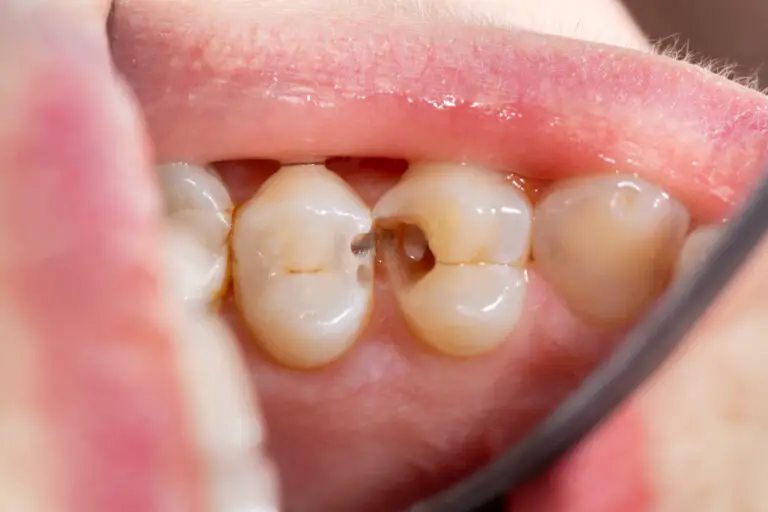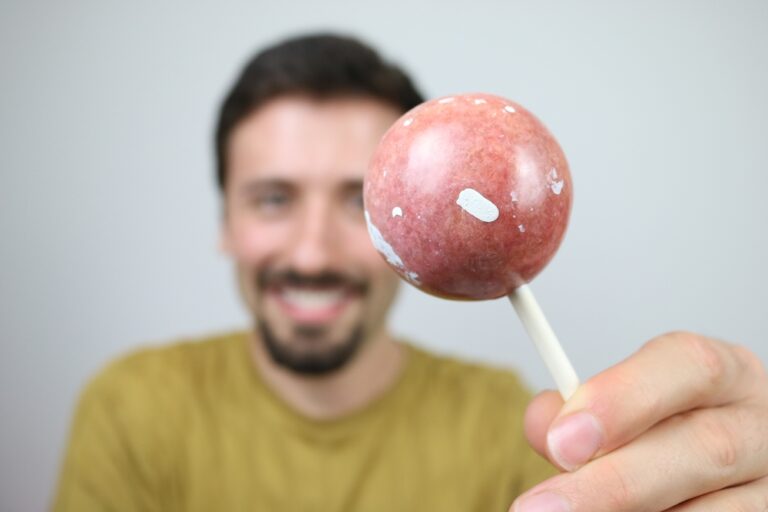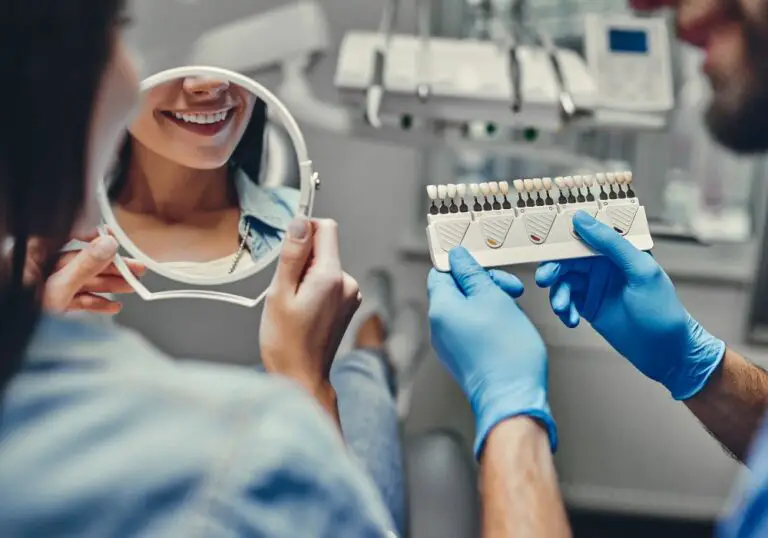Waking up with sore, bruised feeling teeth can be mysterious and frustrating. But in most cases, the cause is one of several common dental problems. Understanding potential reasons your teeth hurt in the morning can help you find the right treatment.
Clenching or Grinding Teeth at Night
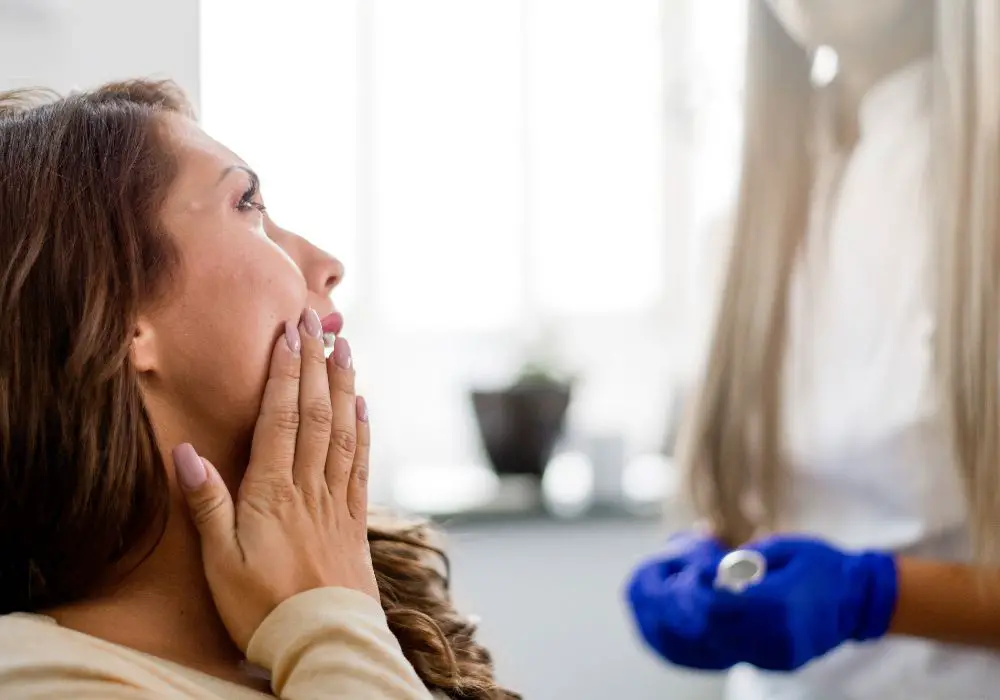
Clenching or grinding your teeth while you sleep is the most likely culprit for waking up with sore teeth. This condition is called bruxism or sleep bruxism. Up to 15-30% of adults experience bruxism, while children often outgrow it as their adult teeth come in.
What Happens During Bruxism
When you have bruxism, you involuntarily clench your jaw muscles tightly together and/or grind your teeth back and forth. This often occurs rhythmically for periods of a few minutes throughout the night. Your sleeping partner may notice audible grinding noises.
Bruxism applies extremely high pressures on the jaw joint and teeth. The force can be up to 250 pounds per square inch – that’s five times more force than normal biting pressure! All this pressure puts a heavy load on the muscles, joints, tooth roots, and nerve tissues.
The masseter muscles that close the jaw and temporalis muscles on the side of your head are most active during bruxism. But you may notice soreness in the tongue, cheeks, and jaw joints upon waking.
Effects of Clenching and Grinding
When subjected to heavy grinding forces night after night, the structures of the mouth undergo strain and damage:
- Tooth pain – The excessive pressures placed on teeth can cause fractures in enamel and dentin. Biting forces compress the pulp inside, making teeth extremely sensitive and painful. This often feels like a diffuse, dull ache.
- Tooth wear – Over time, bruxism wears away enamel and exposes softer dentin. This makes teeth more prone to decay and thermal sensitivity. The teeth may appear flat with small cracks and pits.
- Damage to bone – The heavy forces do not just affect your teeth. They can also thin and resorb the dense bony sockets holding teeth in place. This makes teeth loose and more susceptible to loss.
- Tissue injury– Ligaments and soft tissues supporting the teeth experience micro-trauma. This can loosen teeth over time and recession gum tissue.
- Headaches – Bruxism commonly causes temporal headaches due to sustained muscle tension in the temples and jaw. The headache pain is often described as a constant pressure and soreness rather than throbbing pain. Headaches are more common in women with bruxism.
- Jaw joint issues – Grinding forces also negatively impact the temporomandibular joints on either side of your face. This can lead to pain, clicking, popping, or restricted movement in the jaw joints.
Clearly bruxism can take a heavy toll on the mouth. That’s why it’s important to take steps to protect your oral health if you suspect you’re grinding your teeth at night.
What Causes Bruxism?
Dentists aren’t always certain what causes bruxism. However, these factors are often involved:
- Stress – Emotional stress and anxiety are major risk factors for bruxism. People who experience frequent stress tend to clench or grind at night.
- Obstructive sleep apnea – Breathing interruptions during sleep due to apnea cause arousals out of deep sleep. Bruxism may develop as a result of abnormal sleep patterns.
- Malocclusion – Problems with the bite such as underbite, overbite, crossbite, open bite, and misaligned teeth can all lead to grinding. The bite puts uneven pressures on different teeth.
- Medications – Certain drugs including antidepressants, painkillers, and dopamine agonists may cause bruxism as a side effect.
- Smoking and Alcohol – Smoking is strongly associated with increased bruxism, likely due to nicotine’s stimulant effects. Drinking alcohol before bed can also trigger episodes.
- Gastroesophageal reflux – Acid reflux during sleep may cause teeth grinding as a reflex response to pain and discomfort from stomach acid.
- Family genetics – Having a close family member with bruxism makes you more genetically prone. Children of parents with bruxism are 3 times more likely to grind.
Diagnosing Bruxism
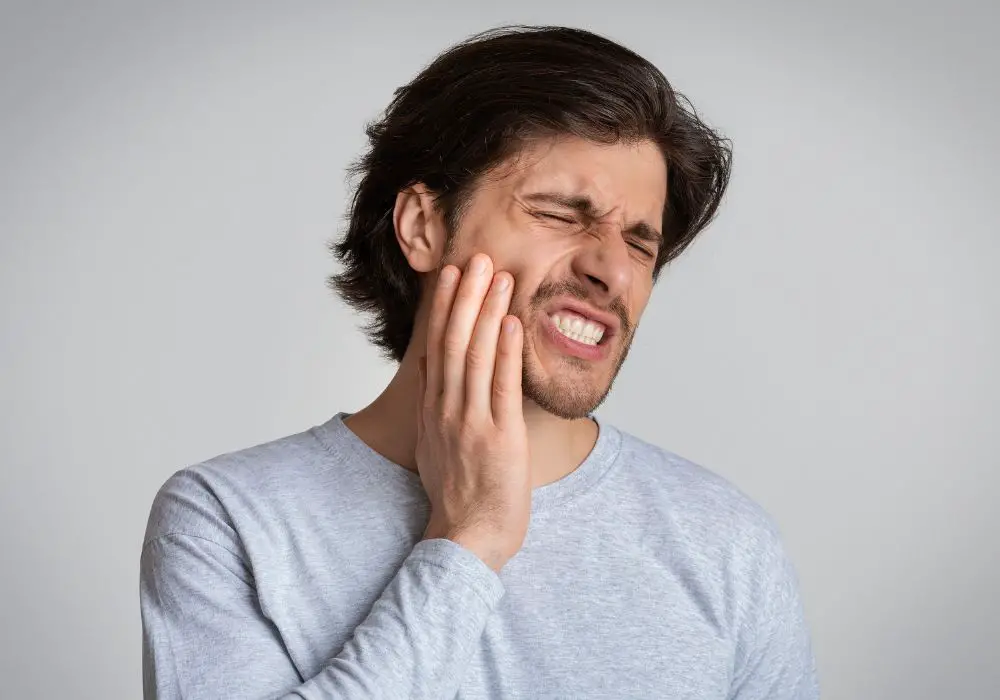
Make an appointment with your dentist if morning tooth pain and headaches make you suspect bruxism. They will examine your mouth for typical signs of grinding and ask about symptoms. These signs can include:
- Worn enamel – Flattened, fractured, or chipped teeth with small dents are red flags for long-term grinding. The tongue side of lower front teeth show the most obvious smoothing and wear.
- Increased tooth mobility – Long-term bruxism can loosen teeth in their sockets due to trauma to supporting bone and tissues. Teeth may shift out of alignment.
- Hypertrophy of muscles – Constant overuse causes the masseter chewing muscles to enlarge visibly. The muscle often feels sore and painful to touch.
- Fractures of crowns or teeth – Grinding can split teeth down to the roots or fracture crowns and dental work like fillings, veneers, or implants.
- Notching of the tongue – You may notice small sores and notches on the sides of your tongue where it rubbed against the teeth during grinding.
Your dentist may also recommend adjunctive tests:
- Sleep study – An overnight sleep study can monitor for sleep apnea and nocturnal bruxism events using EMG and audio. A sleep study is especially useful in moderate to severe bruxism cases.
- Home sleep tape – You can tape a small EMG sensor to the temple and sleep at home to count bruxism episodes per night.
- Intraoral device – A tiny sensor worn inside the mouth during sleep objectively measures muscle activity from clenching and grinding.
Treatment Options for Bruxism
If your dentist diagnoses bruxism, they will suggest therapies to protect your teeth from damage at night. Treatment options include:
Dental approaches
- Occlusal guard – Wearing a custom nightguard appliance provides a cushion between your upper and lower teeth. This prevents damage from grinding and evens out your bite’s pressure. You should wear the guard nightly.
- Botulinum toxin – In severe grinders, Botox injections into the chewing muscles can partially paralyze and relax them for several months. This reduces muscle activity at night.
- Occlusal adjustment – Selectively grinding down high spots in teeth can adjust the bite to reduce strain on some teeth. This also helps determine optimal nightguard thickness.
Medical approaches
- Sleep aids – Sedatives, sleep meds, and muscle relaxants may dampen the urge to grind. However, some drugs like antidepressants can worsen bruxism.
- Stress reduction – Counseling, physical therapy, relaxation techniques, exercise, and massage can help minimize stress and anxiety that contributes to grinding.
- Cognitive behavioral therapy (CBT) – CBT teaches you to modify thought patterns, behaviors, and reactions that lead to bruxism. It helps replace grinding with healthier coping methods.
- Biofeedback – Using small intraoral sensors that feed back muscle activity can teach you to recognize and control clenching urges.
Consistently wearing a sturdy occlusal guard at night and reducing life stress can keep bruxism under control. But damage to teeth, bone, and restorations can still occur over time.
Be sure to see your dentist twice a year for exams to promptly address any problems. Ongoing adjustments to nighttime therapy may be needed as more dental damage appears.
Tooth Sensitivity
Increased sensitivity in one or more teeth could also be making them sore and painful upon waking. Tooth sensitivity occurs when softer inner layers of your teeth become exposed to air, heat, cold, and irritants.
This can happen for several reasons:
- Gum recession – As gum tissue wears away, it exposes the root surface. Root surfaces do not have the thick protective enamel of the crown and can be extremely sensitive.
- Cracks – Small cracks or fractures in teeth allow entry of irritants into the inner pulp layer. This elicits sharp pain.
- Worn enamel – Overly aggressive brushing or grinding can erode the enamel and dentin. This reduces the shield protecting the tooth and makes it more sensitive.
- Whitening treatments – Chemicals like peroxide in whitening strips or trays dehydrate the teeth slightly. This increases passage of irritants into tiny tubules in the dentin and causes temporary sensitivity.
- Tooth decay – Bacterial acids from dental caries and tooth infection dissolve enamel and dentin. As decay reaches the inner pulp, sensitivity results.
If waking up to cold air, cold water, or sweet foods causes sharp tooth pain, see your dentist to identify the cause. They can check for issues like gum recession, small fractures, and dental decay. Prompt treatment will be needed to resolve the problem.
In the meantime, try to minimize pain at home. Brush with sensitivity toothpaste containing potassium nitrate or stannous fluoride. Avoid acidic foods and beverages that erode enamel. Drink with a straw to bypass sensitive tooth surfaces. Have any temporary whitening treatments adjusted or discontinued.
Sinus Congestion and Infection
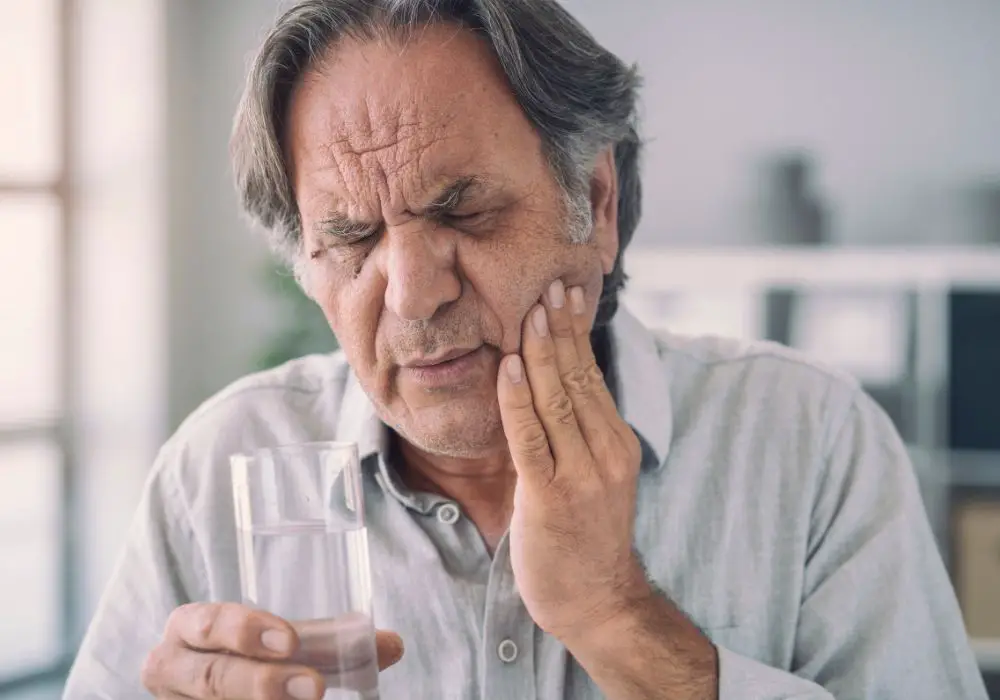
Your maxillary sinuses are air-filled spaces behind your upper cheekbones that help warm and humidify inhaled air. Each maxillary sinus sits above the upper teeth’s roots.
When the sinus membranes become inflamed due to sinusitis, the drainage pathways for mucus can swell shut. This causes a fluid buildup and congestion in the sinuses.
Pressure from mucus accumulation in the maxillary sinuses can compress nerves exiting from the roots of upper teeth. This often causes deep, throbbing pain in those teeth which seems to radiate up into the maxillary sinuses.
The pain is continuous and worsens with changes in pressure when swallowing, coughing, or bending down. Upper back teeth frequently hurt the most.
Other signs of sinusitis potentially causing referred tooth pain include:
- Headache and facial soreness
- Stuffy, congested nose
- Decreased sense of smell
- Postnasal drip
- Halitosis
- Coughing
- Fever
- Fatigue
Bacterial or viral sinus infections cause most cases of acute sinusitis. Allergies, nasal polyps, tooth infections, and anatomical issues can also obstruct sinus drainage and cause pain.
See your doctor if sinus congestion and related toothaches persist. They may prescribe nasal steroid sprays, decongestants, analgesics, and antibiotics if a bacterial sinus infection is confirmed.
Rinsing the sinuses with saline using a Neti pot can help clear mucus and relieve congestion at home. Drink plenty of fluids, rest, and use humidifiers.
Be aware that recurrent or chronic sinus-related toothaches may signal an underlying problem requiring medical intervention. See an ENT specialist for evaluation of potential structural issues with the sinuses if necessary.
Dental Abscess
A pocket of intense infection at the root of a tooth is called a dental abscess. Abscesses frequently cause severe toothaches which intensify at night or upon waking.
What Causes a Tooth Abscess?
A tooth abscess begins when decay or damage allows bacteria to infect the inner pulp chamber. The infection then spreads down the root canal system to the tip of the tooth’s root.
Abscesses most often form in teeth with deep untreated decay. But they can also develop from:
- Cracks or fractures that let bacteria enter
- Previous dental work like fillings or crowns leaking
- Trauma that separates the pulp or damages the root
- Severe periodontal disease eroding bone around the root
As pus builds up in the tissues around the root tip, it causes inflammation, redness, and swelling. The pus has nowhere to drain, leading to throbbing pain as pressure builds up inside the rigid jawbone.
Symptoms of a Tooth Abscess
A tooth abscess causes distinctive symptoms and discomfort:
- Severe, pounding, constant toothache unlike typical dental pain. This is a clear sign of infection.
- Pain when chewing or biting down as it compresses the abscess.
- Lingering pain when releasing bite pressure as nerves remain irritated.
- Pain and sensitivity with hot or cold temperatures.
- Fever, chills, and aching muscles if infection spreads.
- Swelling of the gums around the infected tooth.
- Possible swelling of the jaw or lymph nodes below the jaw.
- Bad breath or foul taste coming from the infected tooth.
- Possible drainage of foul pungent-smelling pus.
- Dark discoloration or “bruising” of gums around the tooth.
- The tooth may feel loose, elevated slightly, or extruded outward.
If you notice these warning signs, call your dentist without delay. A dental abscess requires urgent treatment to prevent the spread of infection.
Treating a Tooth Abscess
Seeing a dentist promptly helps avoid serious complications from a tooth abscess. Treatments to drain infection and relieve pain include:
- Prescribing strong antibiotics to control infection. In severe cases, hospitalization for IV antibiotics may be needed.
- Performing root canal treatment to remove infected pulp and drain the tooth. This may be done immediately or after some initial antibiotic treatment. The tooth can then be restored with a crown.
- Draining the abscess by unroofing it and removing debris. This brings instant relief.
- Extracting the tooth to fully eliminate the abscessed tooth and infection. Nearby teeth often need root canals later due to spread.
- Incision and drainage of accessible gum swellings to relieve pressure.
- Referral to an endodontist for complicated tooth abscesses.
At home before your dental visit, you can help ease abscess discomfort by:
- Taking over-the-counter pain relievers like ibuprofen to reduce inflammation and pain.
- Rinsing with warm salt water to help flush out debris and draw out infection.
- Applying hot or cold compresses against the cheek over the sore area to provide relief. Avoid using heat for more than 10-15 minutes to prevent damage.
With prompt professional dental treatment, a tooth abscess can be resolved before the infection spreads elsewhere in the head and neck. Be vigilent for any recurring symptoms after treatment that may indicate a persistent or new infection. Seek attention quickly in these cases.
Impacted Wisdom Teeth
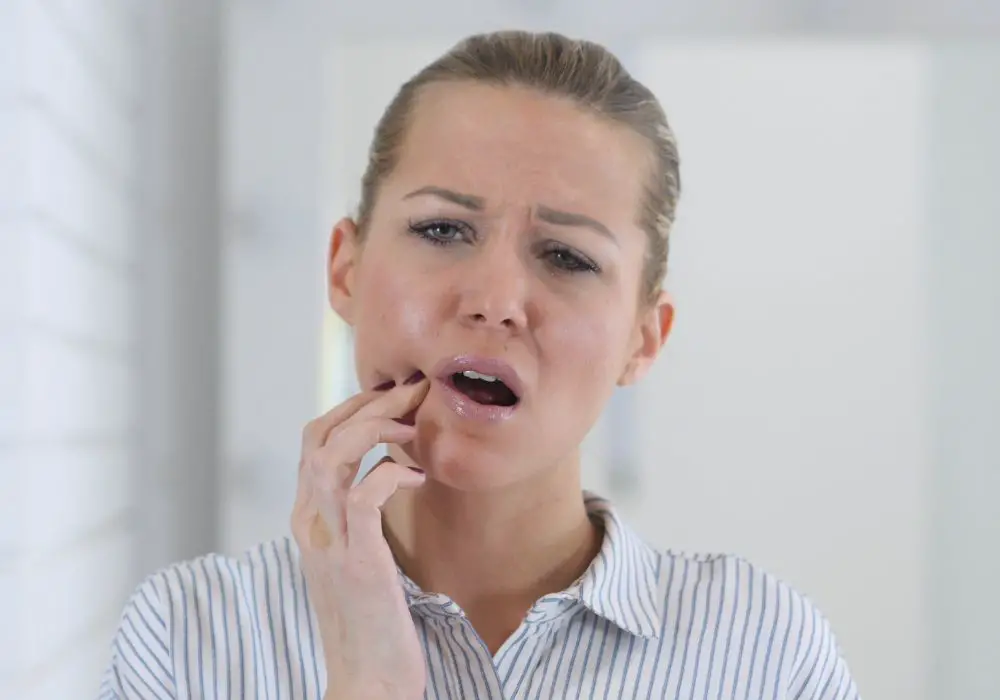
As your last molars come in during your late teens to early 20s, they sometimes lack room to erupt fully. Wisdom teeth (third molars) often become impacted against the teeth in front of them or get stuck against the jawbone.
Partially impacted and erupted wisdom teeth are very prone to problems like:
- Repeated infections – Bacteria and debris easily get trapped beneath the flap of gum tissue over an erupting wisdom tooth. This causes inflammation and infection called pericoronitis which is very painful.
- Cysts or tumors – Non-infectious cysts can also form around trapped wisdom teeth from fluid buildup. Rarely, tumors form.
- Tooth decay – It’s hard to clean impacted wisdom teeth properly. This allows cavities to develop.
- Damage to nearby teeth – Erupting wisdom teeth can put pressure on and displace the teeth next to them. This can lead to pain, bite issues, and periodontal damage.
- Bone loss – Impaction causes the wisdom tooth to erupt at an angle and resorb surrounding bone.
Symptoms of impacted wisdom teeth often include:
- Painful, sore, red, or inflamed gums near the wisdom tooth. Pus may discharge.
- Swelling around the jaw
- Headaches or ear pain toward the painful area
- Difficulty opening your mouth to its full range.
- Bad breath or foul taste from debris around the wisdom tooth.
- Feeling like something is stuck between your teeth.
- Continuous dull ache from teeth crowding.
These symptoms frequently flare up most upon waking after a night of oral bacteria accumulating and infecting tissues around impacted teeth.
See an oral surgeon promptly if your wisdom teeth appear partially emerged but are stuck. Removing them can prevent many future problems and relieve discomfort.
The surgeon will also evaluate whether your other unerupted wisdom teeth appear likely to cause problems when they emerge. Removing them early in your late teens or early 20s prevents future complications.
Questions Patients Frequently Ask
My teeth are extremely sensitive to hot and cold. What could be the cause?
Tooth sensitivity to hot and cold is usually caused by enamel erosion that exposes the inner dentin layer. Possible causes include excessive grinding, gum recession from periodontal disease, tooth whitening treatments, and acidic erosion from bulimia or gastric reflux. Seeing your dentist can help identify the exact cause so it can be addressed.
Why does my jaw click or pop when I open my mouth in the morning?
This is likely due to temporomandibular joint dysfunction (TMJ). Grinding or clenching your teeth puts strain on the TMJ. In the morning, the soft cartilage disc between the bones is slightly displaced until you stretch your jaw. TMJ problems should be evaluated by your dentist.
Why do my teeth sometimes hurt when I breathe cold air?
Sensations of pain or discomfort when breathing cold air or drinking cold water indicate sensitive nerves in your teeth. The most common causes are enamel worn down by grinding or acidic erosion. New cavities and gum recession can also expose nerves. Treatment is needed to address the source before sensitivity worsens.
Is it normal for teeth to hurt during pregnancy?
Hormonal changes during pregnancy can increase blood flow to the mouth and sometimes contribute to gum swelling, tooth sensitivity, and aching. Nausea and acid reflux may also cause erosion. Check with your dentist to ensure any oral pain during pregnancy is not from a dental infection needing prompt care.

